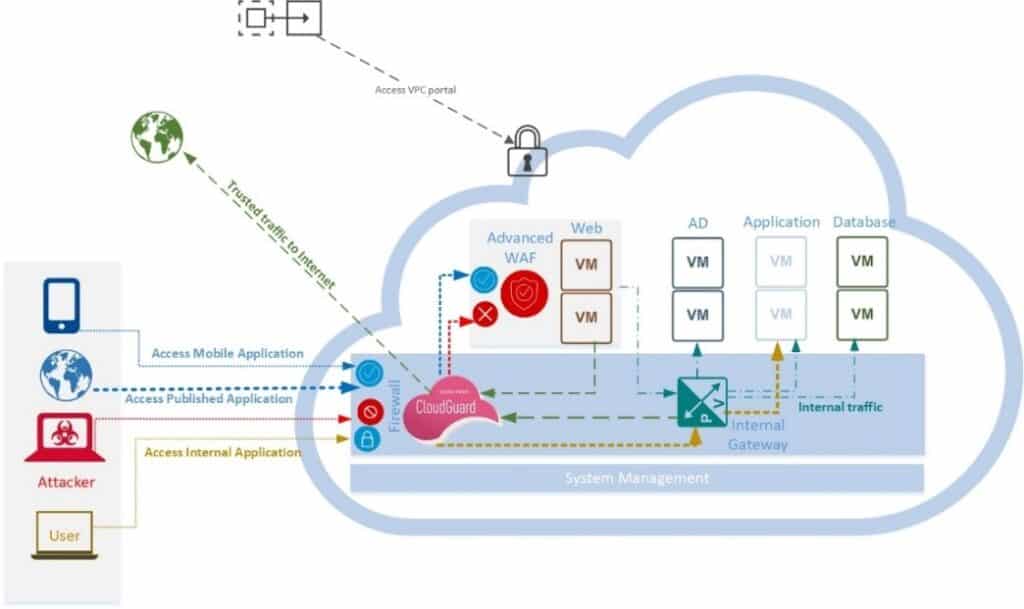Why Cloud infrastructure needs Firewall as a Service (FWaaS) in 2020?
We all know the importance of Cloud computing services, such as Virtual Private Cloud, Hybrid Cloud solutions. However, security for the cloud infrastructure is always a topic that people mention for a long time.
Security in a virtualized environment is extremely important, especially the ability to see detailed traffic flows inside and outside the system.
While specialized physical devices are optimized for the proactive detection of DDoS attacks, the virtualization system, the processing speed depends on the hardware infrastructure, needs to perfect attack identification based on software, and compute as efficiently as possible to proactively control and ensure system safety. That is why we choose strong partners in security software development.
Specifically, the solution will be illustrated through the following figure:

The duties of functional groups in Firewall as a Service (FWaaS) are described in detail as follows:
Firewall
- In principle, NGFW devices are capable of identifying attacks at the network layer, and today it is possible to incorporate TLS proxies to control encrypted traffic, however, much encryption/decryption does. reducing the performance of the FW, so (inbound) applications that incorporate SSL encryption will be handled by the Application Security Solution. Accordingly, NGFW will focus its main functions as:
- External Firewall: with scattered groups of attacking objects (bot, scanning, ….), filtering traffic in the network layer, minimizing DDoS in the network layer
- Internal Gateway and outbound security:
+ Gateway for virtual host partitions
+ Allow valid data streams from within to the Internet (update, agent, backup, trigger, …, depending on the type of application)
+ Allow valid data flow between host regions
+ Probe manifestation of a particularly important group of servers, network resources
+ Eliminate invalid and abnormal data streams - ICAP server to combine with Web application Security in antivirus feature
Advanced WAF
- If in the past, traditional WAF devices would focus a lot on existing security weaknesses on the Web server, vulnerabilities on operating systems, web applications, to create a layer of protection in front of them. This results in the signature being generated quite slowly for a new attack identity, and web servers that are being attacked on purpose with a zero-day attack are still helpless to handle it even with WAF incorporation.
- Today’s web application attacks can completely bypass traditional WAF or NGFW thanks to the ability to understand the application and protection devices, ready to create friendly “bots” that signature cannot. realize. Hacking on service quality, internal data, collecting login parameters, polling passwords, … can be done completely automatically and always have a chance to get results back. Because of that, attack type identification and proactive protection require comprehensive, fast, and least dependency on the webserver.
- Web application develops constantly with the desire to bring convenience, intelligence, and diverse identification links to users. The explosion of technology has been accompanied by an increase in “browser” risky object-based attacks, controlled by users with little or no knowledge of information security. At this weakness, types of tampering and installing malware to listen for data imported from browsers can completely happen invisibly to the end-user.
- Recognizing the above basic problems, continuous and improved security control is of utmost importance.
Why Do Organizations Need FWaaS?
A firewall is the cornerstone of an organization’s cybersecurity strategy. At a minimum, a firewall is capable of defining and enforcing a network boundary by inspecting and filtering all traffic that attempts to cross the border. NGFWs go much further, providing additional functionality that enables an organization to more effectively detect and block attempted cyberattacks.
Traditional, appliance-based firewalls are effective in many contexts, but they are not applicable to all situations. Some potential limitations of an appliance-based firewall include:
- Location: A firewall can only inspect traffic that passes through it. This can make it difficult for an appliance-based firewall to protect remote users to the cloud.
- Scalability: Many firewall appliances have finite resources that limit the amount of traffic that they can inspect and secure. Organizations whose needs grow beyond the limits of their existing hardware must purchase and deploy new hardware.
Therefore, an FWaaS can help an organization to address the situations where these limitations can be an issue.
Advantages of Firewall as a Service
Like other cloud-based services, FWaaS provides a number of benefits to its users. Some examples of benefits that organizations can reap by deploying FWaaS include:
- Unified Security Policy: Firewalls can enforce security policies but only for the traffic that passes through them. With FWaaS, it is much easier for an organization to send all of its traffic through one of its firewalls, enabling enforcement of consistent and unified security policies across its entire network.
- Flexible Deployment: The potential deployment locations of a physical firewall appliance are limited by an organization’s geographic footprint. FWaaS, as a cloud-based resource, does not share the same limitations.
- Simplified Deployment and Maintenance: Purchasing, deploying, and configuring physical firewall appliances can be a complex process and requires specialized knowledge to ensure that all systems are installed and set up correctly. With FWaaS, many of these setup steps are eliminated as these firewalls are implemented as virtualized appliances in the cloud.
- Improved Scalability: With physical firewall appliances, security scalability can be limited by the available hardware. FWaaS offers greatly improved scalability since the pool of available resources can expand and contract as an organization’s needs evolve.
- Increased Flexibility: Appliance-based firewalls offer limited flexibility as upgrades and network restructuring requires changes to physical components. FWaaS enables an organization to adapt more easily to surges in network traffic and the demand for security functionality.
To learn more about the Firewall as a Service (FWaaS), please contact Cloud Space for advice:
- Hotline: (+84) 86 980 5768
- LinkedIn: https://www.linkedin.com/company/cloudspacevn
- Website:
+ https://cloudspace.vn
+ https://hybridcloud.com.vn
+ https://publiccloud.com.vn